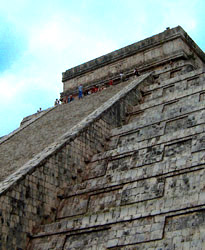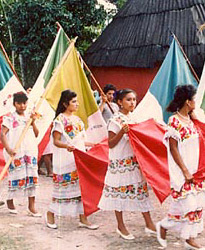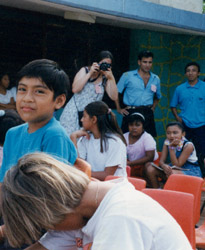|
OSEA Winter & Spring Study Abroad Program
An 11 Week Program
The Winter-Spring Program is conducted in the Mérida, the
capital city of the state of Yucatán, México, and
the Maya town of Pisté, near the archaeological tourism
site of Chichén Itzá.
| WHEN |
January 4 to March 23, 2005
OSEA will be closed for the Winter-Spring Quarter 2006 and
re-open for Summer
2006 Programs. Dr. Castañeda will be teaching
at Indiana University in Latino
Studies and Latin
American Studies Programs the during Spring 2006 in
the Spring Semester of 2006
2007 dates will be announced in summer of 2006
|
| WHERE |
Yucatán,
México |
| FORMAT |
Study
Abroad Program |
| WHAT |
Ethnography
Field School |
| HOUSING |
Home-Stays
with Maya families |
| CREDITS |
16
credits in Anthropology |
| LANGUAGE |
Conversational
Spanish & Maya Offered |
| COST |
$4,750
(covers tuition, room, board, activities fee)
costs for 2007 TBA |
We Offer
Classroom Seminars
Experiential Learning
Field Trips to Heritage & Cultural Sites
On-Site Interactive Learning
Supervised Independent Research
Mentoring Style Field School
Ideal for Students on either Quarter or
Semester System
16 credits are based on actual contact hours & are
equivalent to semester hours (details)
» See the photographs
from the program
Program Scope
The Winter Quarter & Spring Semester Program provides undergraduates
and graduate students the opportunity to have an in-depth field
experience based in cultural immersion and independent research.
OSEA staff provides close supervision and guidance to help students
design and conduct independent research using ethnographic fieldwork
methods.
For Students in Anthropology, Latin American Studies, Women’s
Studies, Cultural Studies, Ethnic Studies and other Interdisciplinary
Programs that focus on culture, cultural politics and consumption.
Students Design and Conduct Independent
Research Projects
Topics include Indigenous politics,
heritage & cultural property, gender & sexualities, tourism,
globalization, urbanism & migration, Maya and alternative
medical-healing systems, governmentalities & politics, cultural
ecology & development, spiritualisms & religion, transculturation,
alternative & peripheral modernities. »
More on student research projects
Concurrent Enrollment
Ask about Concurrent Enrollment opportunities
at your home institution.
Concurrent Enrollment allows you to retain your full time student
status and privileges while participating in OSEA. By paying a
small fee to your study abroad office, the courses appear on your
regular transcript from your home university. By using concurrent
enrollment you avoid the process of having course credits transferred
and you keep your financial aid and full time status.


Photographs: El Castillo at Chichén
Itzá and Community Event in Pisté
|



